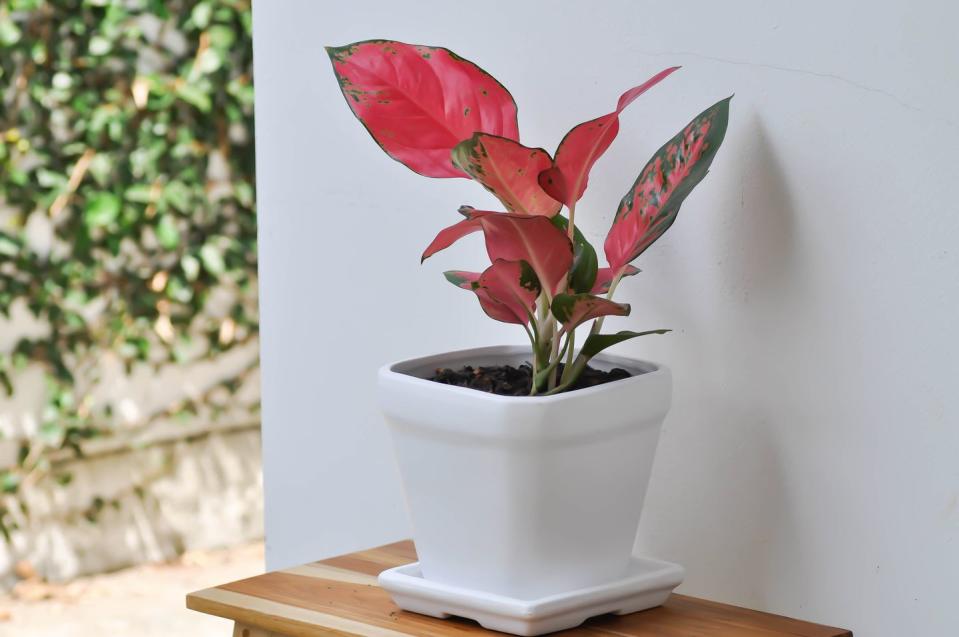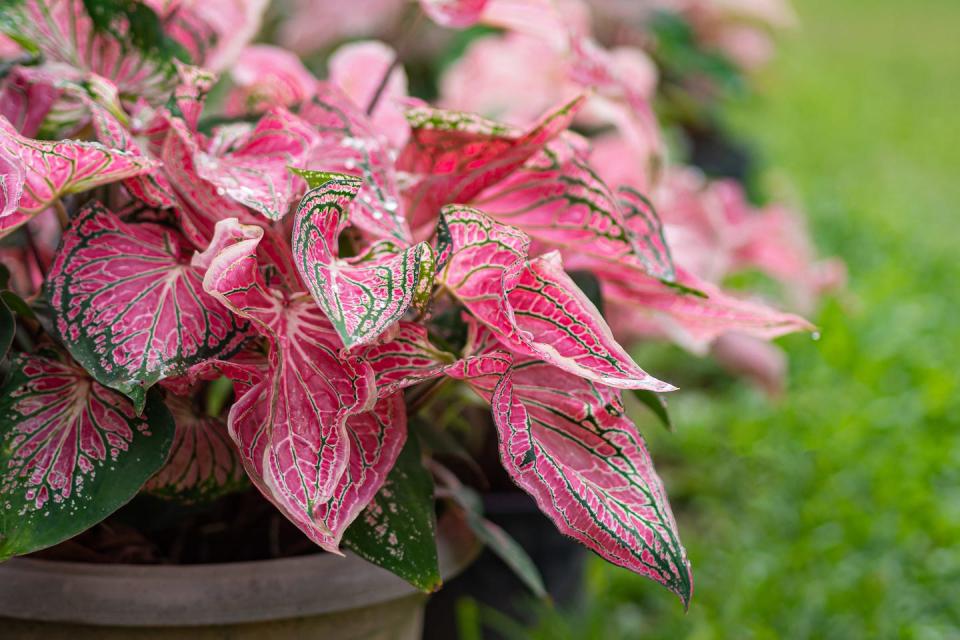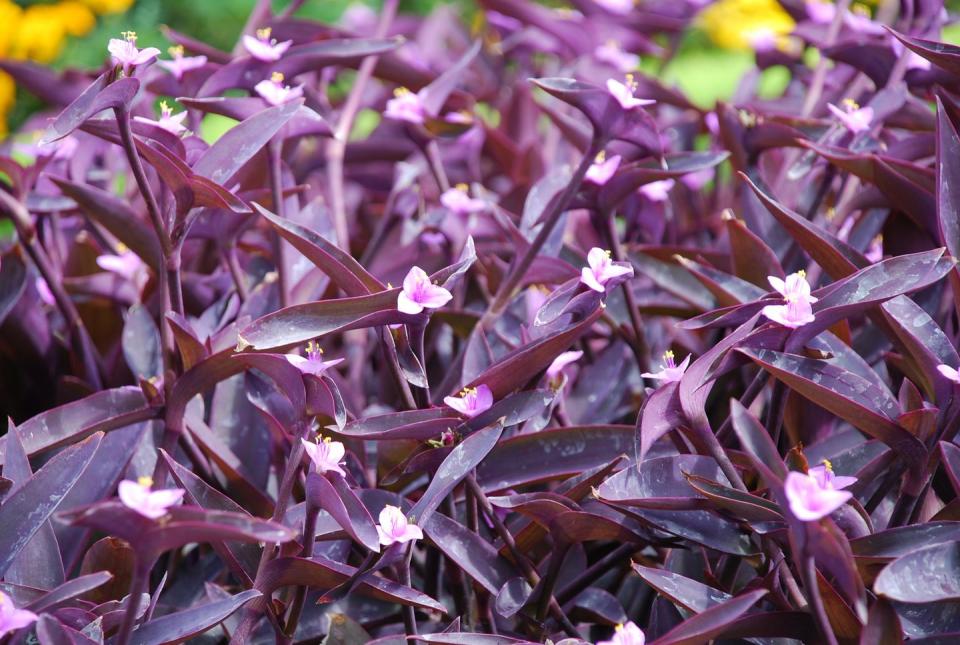Suffering from Houseplant Boredom? Get One of These Pink Plants!

If you’re a houseplant person who loves pink, you’re in luck: Pink houseplants are everywhere!
Many pink houseplants are easy to grow, so you can add a pop of color and whimsy to practically any room of the house. Pink houseplants also make great gifts for the plant lover in your life.
To ensure your plant thrives, give it the right conditions. Most houseplants need bright, indirect light, though a few tolerate low to moderate light levels. (Here are some low-light houseplants to fill shady spaces in your home.) If you don’t have sunny windows, you can also use an LED grow light to keep your plant healthy. (Here are some we recommend.)
Also, don’t overwater! It’s a common mistake. More plants die from overwatering than from under-watering. Always poke your finger in the soil first; if it still feels damp, then wait another day or two and check again. It’s better to err on the side of too dry, rather than too wet.
Finally, when choosing pots for your pink houseplants, we'd suggest you opt for containers that are white, cream, or another neutral color (although pink can be a fun choice, too!). A neutral backdrop allows the plant to show off and stand out, rather than drawing your eye to the container itself. After all, these plants really know how to shine on their own! (Here are some cute planters we love.)
More great houseplant stories:

Polka Dot Plant
This cute speckled houseplant stays petite, so it makes an ideal tabletop plant. It can also be grown as a garden annual in warm climates!
Polka Dot plant makes a good choices for terrariums, too, because it loves humidity. It’s available in varieties with white, red or pink polka dots. (Find more terrarium-loving plants here.)
Light: Bright, indirect light
Water: Keep soil slightly moist
Read more: How to Grow and Care for Your Polka Dot Plant

Wandering Dude
Wandering dude, also known as tradescantia, is a vining plant that’s incredibly easy to grow, so it’s ideal for new plant parents.
It has silvery, green and pink foliage, but the Nanouk variety has pinkish foliage with a magenta underside. It’s a fast grower, but make sure it gets plenty of light or it will become gangly.
Light: Bright, indirect light
Water: Water when it feels mostly dry
Read more: How to Grow and Care for a Wandering Dude Plant

Prayer Plant
Prayer Plant is a low-growing, clumping species, making it a great plant for spilling out over the edges of a bookshelf or end table.
There are several varieties, but red prayer plant has dark green leaves with purple-pink markings and prominent veining. It gets its name because the leaves fold up, as if in prayer, at night.
Light: Bright, indirect
Water: Keep soil lightly moist
Read more: How to Grow and Care for Prayer Plant

Aglaonema
Need a plant that can handle being ignored? If ever a plant survived on neglect, it’s aglaonema!
Also called Chinese evergreen plant, this plant tolerates low light levels and is very forgiving if you forget to water it. The pink variety is speckled with pink splotches.
Light: Low to moderate light
Water: When top few inches of soil feels dry
Read more: How to Grow Aglaonema

Calathea
Also known as the peacock plant, this flashy beauty has striking oval leaves.
Some varieties have spots of cream, pink and silver with purple undersides, while other types have dramatic dark pink coloring. It’s a beautiful easy-care choice for most rooms. The leaves also fold up at night.
Light: Bright, indirect
Water: Keep soil slightly moist
Read more: How to Grow Calathea, the Peacock Plant

Ruby Rubber Plant
Rubber trees have shiny, rubbery leaves and an upright form, making them ideal as a floor plant. They come in several varieties but the Burgundy Rubber Tree has a lovely, dark purple sheen, while Ruby has variegated pink and green leaves.
Light: Bright, indirect
Water: When soil feels slightly dry to the touch
Read more: How to Care for a Rubber Tree Plant Like a Pro

Caladium
With their heart or semi-heart-shaped leaves, caladiums are popular landscape plantings, but they can make pretty indoor plants, too.
Note that this plant goes dormant in late fall, and the leaves will droop and wither. It's not dead! Simply water occasionally, about every 2 to 3 weeks, then start watering normally again in the spring.
Light: Bright, indirect
Water: Keep soil slightly moist
Read more: How to Grow and Care for Caladiums

Fittonia
The colorful foliage of fittonia is slow-growing and stays compact, making it another great terrarium plant.
Varieties include those with white, red or pink foliage.
Light: Bright, indirect
Water: Keep slightly moist
Read more: The 15 Best Plants for Terrariums

Holiday Cactus
Holiday cactus are a long-lived, low-maintenance plant. While the plant itself is not pink, the profuse number of pink or red blooms which cover these plants at each holiday (Thanksgiving, Christmas or Easter), make it a lovely addition when you most need color indoors.
Light: Bright, indirect
Water: Keep slightly moist
Read more: The Difference Between a Thanksgiving and Christmas Cactus

Purple Heart Plant
Another type of tradescantia, this trailing houseplant has more of a purple-pink color, but it’s still stunning!
Grow it in a hanging basket for the most dramatic results, and be sure to give it direct sunlight or use a grow light or it will become leggy. (Find some of our favorite DIY hanging basket ideas here!)
Light: Direct sunlight
Water: Let it dry out slightly between waterings
Read more: How to Grow and Care for Purple Heart Plant

Anthurium
Anthuriums are unique-looking plants with heart-shaped pink or red waxy spathes (the modified leaf around the flower). They need lots of light to flower, but keep them out of direct sunlight, which will scorch the leaves. We like these striking plants in the living room!
Light: Bright, indirect
Water: Let it dry out mostly between waterings
More: 15 Best Living Room Plants

Triostar Stromanthe
Fun variegated foliage with pink and green swaths make this an eye-catching houseplant. It folds its leaves at night. But it’s a little fussy, so make sure it gets what it wants or it will look bad in a hurry.
Light: Bright, indirect
Water: Keep it slightly moist

Rex Begonia
Many types of begonias are grown for their flowers, but rex begonias are grown for their strikingly beautiful foliage.
Many types have bright pink stripes and splashes, offering nice contrast to your typical green houseplants.
Light: Bright, indirect
Water: Allow soil to dry out slightly between waterings

Geogenanthus
Looking for a more subtle pink plant? This distinctive tropical plant has thick, purple-black leaves with pale pink stems.
Known as geo for short, this striking plant is newly-discovered. It adds plenty of drama to a brightly-lit room.
Light: Bright light
Water: Keep it slightly moist

You Might Also Like


